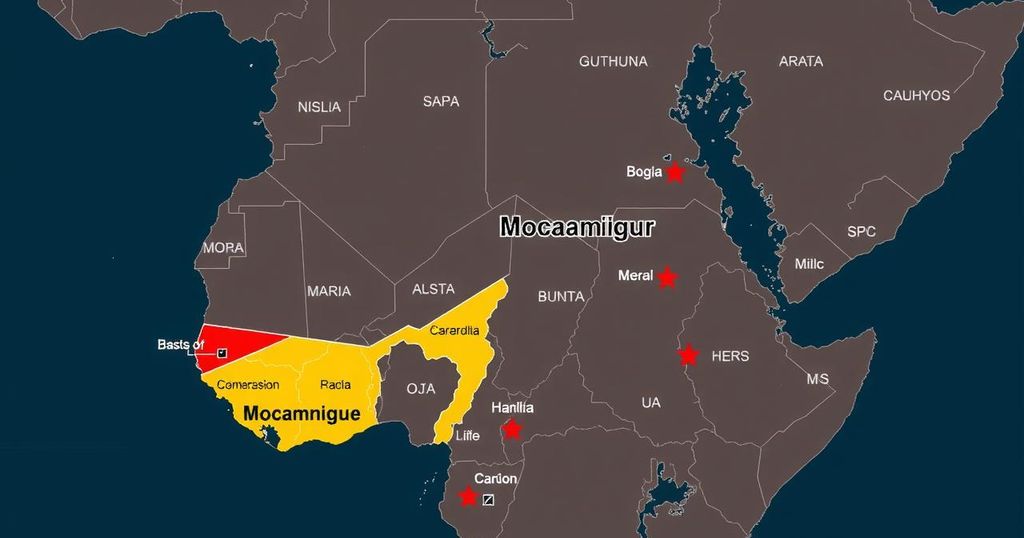Post-Election Violence in Mozambique: Implications for Southern Africa Stability

Mozambique has faced significant post-election violence following disputed election results on October 9, leading to protests and at least 30 deaths. The unrest poses concerns for regional stability in Southern Africa, where credible elections in other countries contrast with Mozambique’s allegations of electoral fraud. Closure of the Lebombo border has disrupted trade and financial flows, impacting the economies of South Africa and other neighboring nations. Historical issues of conflict further complicate the situation, necessitating a collective regional response.
Mozambique has recently witnessed significant unrest following the disputed outcome of the October 9 elections, leading to widespread protests and tragic loss of life. The incumbent Frelimo party, which has been in power for 49 years, faced allegations of electoral irregularities, prompting opposition calls for nationwide demonstrations. The violence raised alarms at the Southern African Development Community summit, as it poses broader implications for the stability of Southern Africa. Notably, at least 30 fatalities have been reported from the turmoil, accompanied by civil unrest in the capital, Maputo. Protesters have confronted police and blocked roads, challenging the legitimacy of the election results, which declared Frelimo’s candidate Daniel Chapo the winner. The opposition candidate, Venancio Mondlane, who received 20% of the vote, has been vocal in disputing the election outcome, stressing the need for accountability. Concerns regarding election integrity are not isolated to Mozambique. While several Southern African nations, such as South Africa and Botswana, have successfully conducted credible elections recently, Mozambique’s situation raises alarms about democratic backsliding in the region. International observers from the European Union identified significant procedural irregularities in Mozambique’s elections, alleging that results had been altered. The troubling trend in Mozambique echoes prior issues faced by Zimbabwe with contested electoral processes fraught with allegations of misconduct. The geopolitical implications of the unrest extend beyond Mozambique’s borders. As a key player in regional trade, instability within Mozambique can disrupt the economies of neighboring countries, many of which are grappling with their challenges, including illegal migration. The closure of the Lebombo border due to protests has resulted in significant financial losses for South African businesses reliant on exports through Mozambique’s Maputo harbor. Estimates suggest daily losses of approximately R10 million ($555,177) stemming from the border closure, significantly harming trade flows in the region. In addition, Mozambique’s historical context of violence, stemming from a protracted civil war and an ongoing insurgency in the Cabo Delgado province, exacerbates the tensions surrounding recent events. Although many displaced individuals have returned, the nation still bears the scars of conflict, affecting its political climate and societal cohesion. Therefore, any further instability could intensify both migration issues and the already fragile economic conditions within the region, posing a profound challenge for Southern Africa’s collective security and prosperity.
The backdrop of Mozambique’s post-election violence is rooted in years of political tension and instability. The October 9 elections, which extended the Frelimo party’s long-standing rule, were marred by allegations of electoral fraud, drawing scrutiny from international observers like the European Union. As the Southern African Development Community prepares to address these concerns, it is essential to recognize the broader implications for regional stability, especially given the historical context of Mozambique’s civil strife and ongoing insurgency challenges.
In conclusion, the post-election violence in Mozambique serves as a critical flashpoint for Southern Africa, highlighting significant challenges related to democratic governance, electoral integrity, and regional economic stability. The potential implications of unrest may extend beyond Mozambique, affecting trade and migration patterns within the region. Addressing these issues collaboratively among neighboring countries is crucial for fostering a secure and prosperous Southern Africa.
Original Source: apnews.com







